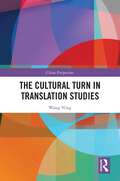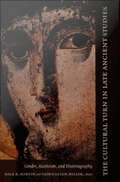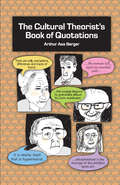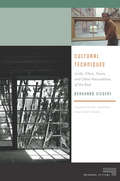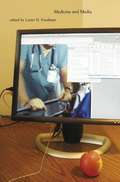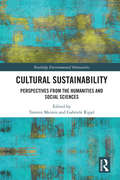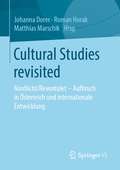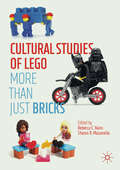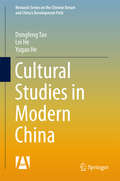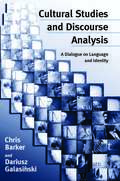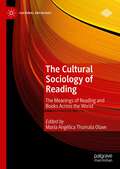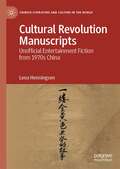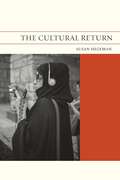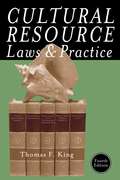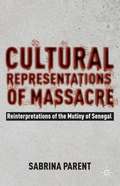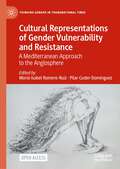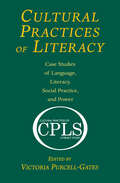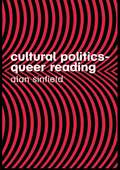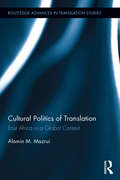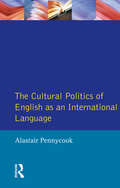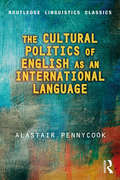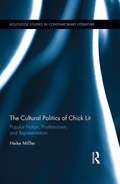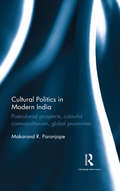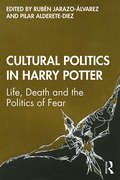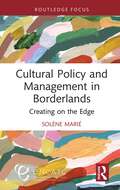- Table View
- List View
The Cultural Turn in Translation Studies (China Perspectives)
by Wang NingApplying the latest Western translation theories to the situation in China, this book redefines translation from an interdisciplinary and intercultural perspective, bringing intercultural semiotic translation into the sight of translation researchers. The book systematically expounds on the cultural turn in translation studies, and contributes to the escape of translation studies from the "cage of language". It focuses on discussing the deconstructive, post-modernist, and cultural translation theories that have motivated and promoted the cultural turn, especially Benjamin’s translation theory, Derrida’s deconstructive view of translation, and post-colonial translation theory. It also discusses in detail the theories of major international translation theorists, including Hillis Miller, Wolfgang Iser, Edward Said, Gayatri Spivak, Homi Bhabha, André Lefevere, Susan Bassnett, and Lawrence Venuti. These theories are mostly based on examples from Western or English-language texts, leaving a wide gap in the discourse of the field. This book seeks to fill that gap. For example, intercultural semiotic translation is defined and explained through the successful experiences of the Chinese translator Fu Lei. The role of translation during the Chinese revolution and the relocation of Chinese culture in the global cultural landscape through translation are also discussed. This book will be an essential read to students and scholars of translation studies and Chinese studies. It will also be a useful resource for translators and researchers of comparative literature and cultural studies.
The Cultural Turn in Late Ancient Studies: Gender, Asceticism, and Historiography
by Dale B. Martin Patricia Cox MillerThe essays in this provocative collection exemplify the innovations that have characterized the relatively new field of late ancient studies. Focused on civilizations clustered mainly around the Mediterranean and covering the period between roughly 100 and 700 CE, scholars in this field have brought history and cultural studies to bear on theology and religious studies. They have adopted the methods of the social sciences and humanities--particularly those of sociology, cultural anthropology, and literary criticism. By emphasizing cultural and social history and considerations of gender and sexuality, scholars of late antiquity have revealed the late ancient world as far more varied than had previously been imagined. The contributors investigate three key concerns of late ancient studies: gender, asceticism, and historiography. They consider Macrina's scar, Mary's voice, and the harlot's body as well as Augustine, Jovinian, Gregory of Nazianzus, Julian, and Ephrem the Syrian. Whether examining how animal bodies figured as a means for understanding human passion and sexuality in the monastic communities of Egypt and Palestine or meditating on the almost modern epistemological crisis faced by Theodoret in attempting to overcome the barriers between the self and the wider world, these essays highlight emerging theoretical and critical developments in the field. Contributors. Daniel Boyarin, David Brakke, Virginia Burrus, Averil Cameron, Susanna Elm, James E. Goehring, Susan Ashbrook Harvey, David G. Hunter, Blake Leyerle, Dale B. Martin, Patricia Cox Miller, Philip Rousseau, Teresa M. Shaw, Maureen A. Tilley, Dennis E. Trout, Mark Vessey
The Cultural Theorist's Book of Quotations
by Arthur Asa BergerWhere did you see it—that perfect quotation from Foucault or Kristeva to use in your upcoming keynote address? Stop the search and pick up Arthur Berger’s handy book of over 300 concise quotations from the vast literature in cultural theory. This compilation will give you just the right snappy quote to help prepare that lecture, write that paper, fill that Power Point, or drop a few bon mots at a university reception. Organized by theoretical model (semiotic, Marxist, psychoanalytic, gender, postmodernist), Berger pulls together the most succinct, meaningful passages of the key theorists of our time for those wanting to distill cultural theory to its essence.
Cultural Techniques: Grids, Filters, Doors, and Other Articulations of the Real
by Geoffrey Winthrop-Young Bernhard SiegertIn a crucial shift within posthumanistic media studies, Bernhard Siegert dissolves the concept of media into a network of operations that reproduce, displace, process, and reflect the distinctions fundamental for a given culture. Cultural Techniques aims to forget our traditional understanding of media so as to redefine the concept through something more fundamental than the empiricist study of a medium’s individual or collective uses or of its cultural semantics or aesthetics. Rather, Siegert seeks to relocate media and culture on a level where the distinctions between object and performance, matter and form, human and nonhuman, sign and channel, the symbolic and the real are still in the process of becoming. The result is to turn ontology into a domain of all that is meant in German by the word Kultur. Cultural techniques comprise not only self-referential symbolic practices like reading, writing, counting, or image-making. The analysis of artifacts as cultural techniques emphasizes their ontological status as “in-betweens,” shifting from firstorder to second-order techniques, from the technical to the artistic, from object to sign, from the natural to the cultural, from the operational to the representational. Cultural Techniques ranges from seafaring, drafting, and eating to the production of the sign-signaldistinction in old and new media, to the reproduction of anthropological difference, to the study of trompe-l’oeils, grids, registers, and doors. Throughout, Siegert addresses fundamental questions of how ontological distinctions can be replaced by chains of operations that process those alleged ontological distinctions within the ontic. Grounding posthumanist theory both historically and technically, this book opens up a crucial dialogue between new German media theory and American postcybernetic discourses.
Cultural Sutures: Medicine and Media
by Lester D. FriedmanMedicine and the media exist in a unique symbiosis. Increasingly, health-care consumers turn to media sources--from news reports to Web sites to tv shows--for information about diseases, treatments, pharmacology, and important health issues. And just as the media scour the medical terrain for news stories and plot lines, those in the health-care industry use the media to publicize legitimate stories and advance particular agendas. The essays in Cultural Sutures delineate this deeply collaborative process by scrutinizing a broad range of interconnections between medicine and the media in print journalism, advertisements, fiction films, television shows, documentaries, and computer technology. In this volume, scholars of cinema studies, philosophy, English, sociology, health-care education, women's studies, bioethics, and other fields demonstrate how the world of medicine engages and permeates the media that surround us. Whether examining the press coverage of the Jack Kevorkian-euthanasia controversy; pondering questions about accessibility, accountability, and professionalism raised by such films as Awakenings, The Doctor, and Lorenzo's Oil; analyzing the depiction of doctors, patients, and medicine on E. R. and Chicago Hope; or considering the ways in which digital technologies have redefined the medical body, these essays are consistently illuminating and provocative. Contributors. Arthur Caplan, Tod Chambers, Stephanie Clark-Brown, Marc R. Cohen, Kelly A. Cole, Lucy Fischer, Lester D. Friedman, Joy V. Fuqua, Sander L. Gilman, Norbert Goldfield, Joel Howell, Therese Jones, Timothy Lenoir, Gregory Makoul, Marilyn Chandler McEntyre, Faith McLellan, Jonathan M. Metzl, Christie Milliken, Martin F. Norden, Kirsten Ostherr, Limor Peer, Audrey Shafer, Joseph Turow, Greg VandeKieft, Otto F. Wahl
Cultural Sustainability: Perspectives from the Humanities and Social Sciences (Routledge Environmental Humanities)
by Torsten Meireis Gabriele RipplIf the political and social benchmarks of sustainability and sustainable development are to be met, ignoring the role of the humanities and social, cultural and ethical values is highly problematic. People’s worldviews, beliefs and principles have an immediate impact on how they act and should be studied as cultural dimensions of sustainability. Collating contributions from internationally renowned theoreticians of culture and leading researchers working in the humanities and social sciences, this volume presents an in-depth, interdisciplinary discussion of the concept of cultural sustainability and the public visibility of such research. Beginning with a discussion of the concept of cultural sustainability, it goes on to explore its interaction with philosophy, theology, sociology, economics, arts and literature. In doing so, the book develops a much needed concept of ‘culture’ that can be adapted to various disciplines and applied to research on sustainability. Addressing an important gap in sustainability research, this book will be of great interest to academics and students of sustainability and sustainable development, as well as those studying sustainability within the humanities and social sciences, such as cultural studies, ethics, theology, sociology, literature and history.
Cultural Studies revisited: Nordlicht/Revontulet - Aufbruch in Österreich und internationale Entwicklung
by Johanna Dorer Roman Horak Matthias MarschikDieses Buch präsentiert Cultural Studies, beginnend mit der österreichischen Aufbruchsstimmung und begleitet von internationalen Stimmen der Tagungsteilnehmer*innen in Tampere und Birmingham. Es zeigt die vielfältige Forschungswelt der Cultural Studies bis heute und schlägt Brücken in die Zukunft.Cultural Studies waren ein Versprechen und vielleicht auch eine wissenschaftliche Verheißung. Im wahrsten Wortsinn erschienen sie, als in Finnland die ersten internationalen Tagungen stattfanden, wie ein Nordlicht am Horizont: Revontulet. Die Crossroads-Konferenzen in Tampere (1996, 1998) und Birmingham (2000) waren für Wissenschaftler*innen der Beginn eines interventionistischen Wissenschaftsprojekts, das in Wien seinen Ursprung im Institut für Kulturstudien (IKUS) hatte.
Cultural Studies of LEGO: More Than Just Bricks
by Rebecca C. Hains Sharon R. MazzarellaThis collection examines LEGO from an array of critical and cultural studies approaches, foregrounding the world-renowned brand's ideological power and influence. Given LEGO’s status as the world’s largest toy manufacturer and a transnational multimedia conglomerate, Cultural Studies of Lego: More Than Just Bricks considers LEGO media's cultural messages; creativity with and within LEGO artifacts; and diversity within the franchise, including gender and race representation. The chapters’ in-depth analyses of topics including LEGO films, marketing tactics, play sets, novelizations, and fans offer compelling insights relevant to those interested in the LEGO brand and broader trends in the children’s popular culture market alike.
Cultural Studies in Modern China (Research Series on the Chinese Dream and China’s Development Path)
by Dongfeng Tao Lei He Yugao HeAs the first book to introduce and analyze cultural studies in contemporary China, this volume is an important resource for Western scholars wishing to understand the rise and development of cultural studies in China. Organized according to subject, it includes extensive material examining the relationships between culture and politics, as well as culture and institutions in contemporary China. Further, it discusses the development of cultural debates.
Cultural Studies and Discourse Analysis: A Dialogue on Language and Identity (Cultural Studies)
by Chris Barker Dariusz Galasi SkiThis novel and important book brings together insights from cultural studies and critical discourse analysis to examine the fruitful links between the two. Cultural Studies and Discourse Analysis shows that critical discourse analysis is able to provide the analytic context, skills and tools by which we can study how language constructs, constitutes and shapes the social world and demonstrates in detail how the methodological approach of critical discourse analysis can enhance cultural studies. In a richly argued discussion, the authors show how marrying the methodology of critical discourse analysis with cultural studies enlarges our understanding of gender and ethnicity.
The Cultural Sociology of Reading: The Meanings of Reading and Books Across the World (Cultural Sociology)
by María Angélica Thumala OlaveThis book showcases recent work about reading and books in sociology and the humanities across the globe. From different standpoints and within the broad perspectives within the cultural sociology of reading, the eighteen chapters examine a range of reading practices, genres, types of texts, and reading spaces. They cover the Anglophone area of the United States, the United Kingdom and Australia; the transnational, multilingual space constituted by the readership of the Colombian novel One Hundred Years of Solitude; nineteenth-century Chile; twentieth-century Czech Republic; twentieth century Swahili readings in East Africa; contemporary Iran; and China during the cultural revolution and the post-Mao period. The chapters contribute to current debates about the valuation of literature and the role of cultural intermediaries; the iconic properties of textual objects and of the practice of reading itself; how reading supports personal, social and political reflection; bookstores as spaces for sociability and the interplay of high and commercial cultures; the political uses of reading for nation-building and propaganda, and the dangers and gratifications of reading under repression. In line with the cultural sociology of reading’s focus on meaning, materiality and emotion, this book explores the existential, ethical and political consequences of reading in specific locations and historical moments.
Cultural Revolution Manuscripts: Unofficial Entertainment Fiction from 1970s China (Chinese Literature and Culture in the World)
by Lena HenningsenThis book investigates handwritten entertainment fiction (shouchaoben wenxue) which circulated clandestinely during the Chinese Cultural Revolution. Lena Henningsen’s analyses of exemplary stories and their variation across different manuscript copies brings to light the creativity of these readers-turned-copyists. Through copying, readers modified the stories and became secondary authors who reflected on the realities of the Cultural Revolution. Through an enquiry into actual reading practices as mapped in autobiographical accounts and into intertextual references within the stories, the book also positions manuscript fiction within the larger reading cosmos of the long 1970s. Henningsen analyzes the production, circulation and consumption of these texts, considering continuities across the alleged divide of the end of the Mao-era and the beginning of the reform period. The book further reveals how these texts achieved fruitful afterlives as re-published bestsellers or as adaptations into comic books or movies, continuing to shape the minds of their audience and the imaginations of the past.Chapter 5 is available open access under a Creative Commons Attribution 4.0 International License via link.springer.com.
The Cultural Return
by Susan HegemanThis insightful book tracks the concept of culture across a range of scholarly disciplines and much of the twentieth and early twenty-first centuries--years that saw the emergence of new fields and subfields (cultural studies, the new cultural history, literary new historicism, as well as ethnic and minority studies) and came to be called "the cultural turn." Since the 1990s, however, the idea of culture has fallen out of scholarly favor. Susan Hegeman engages with a diversity of disciplines, including anthropology, literary studies, sociology, philosophy, psychology, and political science, to historicize the rise and fall of the cultural turn and to propose ways that culture may still be a vital concept in the global present.
Cultural Resource Laws and Practice (Heritage Resource Management Series) (Fourth Edition)
by Thomas F. KingIn this fourth edition of the CRM classic, Thomas F. King shares his expertise in dealing with laws regulating the use of cultural resources. He explains the various federal, state, and local laws governing the protection of resources, how they have been interpreted, how they operate in practice, and even how they are sometimes in contradiction with each other.
Cultural Representations of Massacre
by Sabrina ParentIn this book, Parent puts together a history of representations of the 1944 mutiny in Senegal. Combining firsthand analysis of the works and their intertextual interactions as well an external perspective, Parent engages with history, literature, film, poetics, and politics and highlights the importance of remembering the past.
Cultural Representations of Gender Vulnerability and Resistance: A Mediterranean Approach to the Anglosphere (Thinking Gender in Transnational Times)
by Maria Isabel Romero-Ruiz Pilar Cuder-DomínguezThis Open Access book considers the cultural representation of gender violence, vulnerability and resistance with a focus on the transnational dimension of our contemporary visual and literary cultures in English. Contributors address concepts such as vulnerability, resilience, precarity and resistance in the Anglophone world through an analysis of memoirs, films, TV series, and crime and literary fiction across India, Ireland, Canada, Australia, the US, and the UK. Chapters explore literary and media displays of precarious conditions to examine whether these are exacerbated when intersecting with gender and ethnic identities, thus resulting in structural forms of vulnerability that generate and justify oppression, as well as forms of individual or collective resistance and/or resilience. Substantial insights are drawn from Animal Studies, Critical Race Studies, Human Rights Studies, Post-Humanism and Postcolonialism. This book will be of interest to scholars in Gender Studies, Media Studies, Sociology, Culture, Literature and History.Grant FFI2017-84555-C2-1-P (research Project “Bodies in Transit: Genders, Mobilities, Interdependencies”) funded by MCIN/AEI/ 10.13039/501100011033 and by “ERDF A way of making Europe.”
Cultural Practices of Literacy: Case Studies of Language, Literacy, Social Practice, and Power
by Victoria Purcell-GatesThis volume presents case studies of literacy practices as shaped by culture, language, community, and power. Covering a range of contexts and exploring a number of relevant dimensions in the evolving picture of literacy as situated, multiple, and social, the studies are grouped around four overarching themes:*Language, Literacy, and Hegemony;*The Immigrant Experience: Language, Literacies, and Identities;*Literacies In-/Out-of-School and On the Borders; and*New Pedagogies for New Literacies. It is now generally recognized that literacy is multiple and woven within the sociocultural lives of communities, but what is not yet fully understood is how it is multiple--how this multiplicity plays out across and within differing sociocultural contexts. Such understanding is critical for crafting school literacy practices in response to the different literacy sets brought to school by different learners. Toward this end it is necessary to know what those sets are composed of. Each of the case studies contributes to building this knowledge in new and interesting ways. As a whole the book provides a rich and complex portrait of literacy-in-use. Cultural Practices of Literacy: Case Studies of Language, Literacy, Social Practice, and Power advances sociocultural research and theory pertaining to literacy development as it occurs across school and community boundaries and cultural contexts and in and out of school. It is intended for researchers, students, professionals across the field of literacy studies and schooling, including specialists in family literacy, community literacy, adult literacy, critical language studies, multiliteracies, youth literacy, international education, English as a second language, language and social policy, and global literacy.
Cultural Politics - Queer Reading (New Cultural Studies)
by Alan SinfieldFollowing a first edition that generated wide-spread debate, Cultural Politics – Queer Reading is a bold study of the future of critical theory and the role of gender, ethnicity and cultures within academic literary studies.An illuminating introduction to the second edition revisits the book's agenda for a new form of cultural critique and a truly political lesbian and gay studies. Sinfield renews his call for an 'Englit' that incorporates ongoing study of the cultures of ethnicity, gender and sexuality.Challenging the assumptions that have shaped the study of English literature, Sinfield engages provocatively with topics such as the gendering of literary culture, the sexual politics of psychoanalysis during the Cold War and the history of cultural materialism. He discusses such key figures as William Shakespeare, Christopher Marlowe, Walt Whitman, Arthur Miller, Holly Hughes, Audre Lorde and Jeanette Winterson.This influential investigation of the principles and practice that may form dissident reading, forms compelling argument for intellectual allegiances beyond the academy.
Cultural Politics of Translation: East Africa in a Global Context (Routledge Advances in Translation and Interpreting Studies)
by Alamin M. MazruiThis book is the first full-length examination of the cultural politics at work in the act of translation in East Africa, providing close critical analyses of a variety of texts that demonstrate the myriad connections between translation and larger socio-political forces. Looking specifically at texts translated into Swahili, the book builds on the notion that translation is not just a linguistic process, but also a complex interaction between culture, history, and politics, and charts this evolution of the translation process in East Africa from the pre-colonial to colonial to post-colonial periods. It uses textual examples, including the Bible, the Qur’an, and Frantz Fanon’s Wretched of the Earth, from five different domains – religious, political, legal, journalistic, and literary – and grounds them in their specific socio-political and historical contexts to highlight the importance of context in the translation process and to unpack the complex relationships between both global and local forces that infuse these translated texts with an identity all their own. This book provides a comprehensive portrait of the multivalent nature of the act of translation in the East African experience and serves as a key resource for students and researchers in translation studies, cultural studies, post-colonial studies, African studies, and comparative literature.
The Cultural Politics of English as an International Language (Language In Social Life)
by Alastair PennycookCovering a wide range of areas including international politics, colonial history, critical pedagogy, postcolonial literature and applied linguitics, this book examines ways to understand the cultural and political implications of the global spread of English.Firstly, it explores how a particular view of English as an international language has come into being by examining its colonial origins, its connections to linguistics and applied linguistics, and its relationships to the global spread of teaching practices. It then offers an alternative, critical understanding through the concept of the 'worldliness' of English. This concept suggests that English can never be removed from the social, cultural, economic or political contexts in which it is used.
The Cultural Politics of English as an International Language (Routledge Linguistics Classics)
by Alastair PennycookA much-cited and highly influential text by Alastair Pennycook, one of the world authorities in sociolinguistics, The Cultural Politics of English as an International Language explores the globalization of English by examining its colonial origins, its connections to linguistics and applied linguistics, and its relationships to the global spread of teaching practices. Nine chapters cover a wide range of key topics including: international politics colonial history critical pedagogy postcolonial literature. The book provides a critical understanding of the concept of the ‘worldliness of English’, or the idea that English can never be removed from the social, cultural, economic or political contexts in which it is used. Reissued with a substantial preface, this Routledge Linguistics Classic remains a landmark text, which led a much-needed critical and ideologically-informed investigation into the burgeoning topic of World Englishes. Key reading for all those working in the areas of Applied Linguistics, Sociolinguistics and World Englishes.
The Cultural Politics of Chick Lit: Popular Fiction, Postfeminism and Representation (Routledge Studies in Contemporary Literature)
by Heike MisslerChick lit is the marketing label attributed to a surge of books published in the wake of Helen Fielding's Bridget Jones's Diary (1996) and Candace Bushnell's Sex and the City (1997). Branded by their pink or pastel-coloured book covers, chick-lit novels have been a highly successful and ubiquitous product of women's popular culture since the late 1990s. This study traces the evolution of chick lit not only as a genre of popular fiction, but as a cultural phenomenon. It complicates the genealogy of the texts by situating them firmly in the context of age-old debates about female literary creation, and by highlighting the dynamics of the popular-fiction market. Offering a convincing dissection of the formula which lies at the heart of chick lit, as well as in-depth analyses of a number of chick-lit titles ranging from classic to more recent and edgier texts, this book yields new insights into a relatively young field of academic study. Its close readings provide astute assessments of chick lit's notoriously skewed representational politics, especially with regard to sexuality and ethnicity, which feed into current discussions about postfeminism. Moreover, the study makes a unique contribution to the scholarly debate of chick lit by including an analysis of the (online) fan communities the genre has fostered. The Cultural Politics of Chick Lit weaves a sound methodological network, drawing on reader-response criticism; feminist, gender, and queer theory; affect studies; and whiteness studies. This book is an accessible and engaging study for anyone interested in postfeminism and popular culture.
Cultural Politics in Modern India: Postcolonial prospects, colourful cosmopolitanism, global proximities
by Makarand R. ParanjapeIndia’s global proximities derive in good measure from its struggle against British imperialism. In its efforts to become a nation, India turned modern in its own unusual way. At the heart of this metamorphosis was a "colourful cosmopolitanism," the unique manner in which India made the world its neighbourhood. The most creative thinkers and leaders of that period reimagined diverse horizons. They collaborated not only in widespread anti-colonial struggles but also in articulating the vision of alter-globalization, universalism, and cosmopolitanism. This book, in revealing this dimension, offers new and original interpretations of figures such as Kant, Tagore, Heidegger, Gandhi, Aurobindo, Gebser, Kosambi, Narayan, Ezekiel, and Spivak. It also analyses cultural and aesthetic phenomena, from the rasa theory to Bollywood cinema, explaining how Indian ideas, texts, and cultural expressions interacted with a wider world and contributed to the making of modern India.
Cultural Politics in Harry Potter: Life, Death and the Politics of Fear
by Rubén Jarazo-Álvarez Pilar Alderete-DiezCultural Politics in Harry Potter: Life, Death and the Politics of Fear is the first book-length analysis of topics, such as death, fear and biopolitics in J.K. Rowling’s work from controversial and interdisciplinary perspectives. This collection brings together recent theoretical and applied cultural studies and focuses on three key areas of inquiry: (1) wizarding biopolitics and intersected discourses; (2) anxiety, death, resilience and trauma; and (3) the politics of fear and postmodern transformations. As such, this book: provides a comprehensive overview of national and gender discourses, as well as the transiting bodies in-between, in relation to the Harry Potter books series and related multimedia franchise; situates the transformative power of death within the fandom, transmedia and film depictions of the Potterverse and critically deconstructs the processes of subjectivation and legitimation of death and fear; examines the strategies and mechanisms through which cultural and political processes are managed, as well as reminding us how fiction and reality intersect at junctions, such as terrorism, homonationalism, materialism, capitalism, posthumanism and technology. Exploring precisely what is cultural about wizarding politics, and what is political about culture, this book is key reading for students of contemporary literature, media and culture, as well as anyone with an interest in the fictional universe and wizarding world of Harry Potter.
Cultural Policy and Management in Borderlands: Creating on the Edge (ENCATC Advances in Cultural Management and Policy)
by Solène MariéThis book uncovers the processes at play in the development of cultural policies, projects and networks in spaces at the edge of their countries, marked by their proximity with a borderline.On a subject which is studied mainly in North America and Western Europe and based on individual case studies, its originality lies in offering a comparative view on the subject, as well as in comparing a European case – the France-Germany borderlands – to a South American case – the Brazil-Uruguay borderlands. Through a multi-sited ethnographic study, the author develops an analysis of the formal and informal processes and networks which sustain this cultural action, looking at the relative contribution of processes led by institutions, cultural agents and the civil society.This book provides theoretical tools for the analysis of the way cultural ecosystems function in borderlands and is valuable reading for scholars of cultural policy, geography and arts management.
